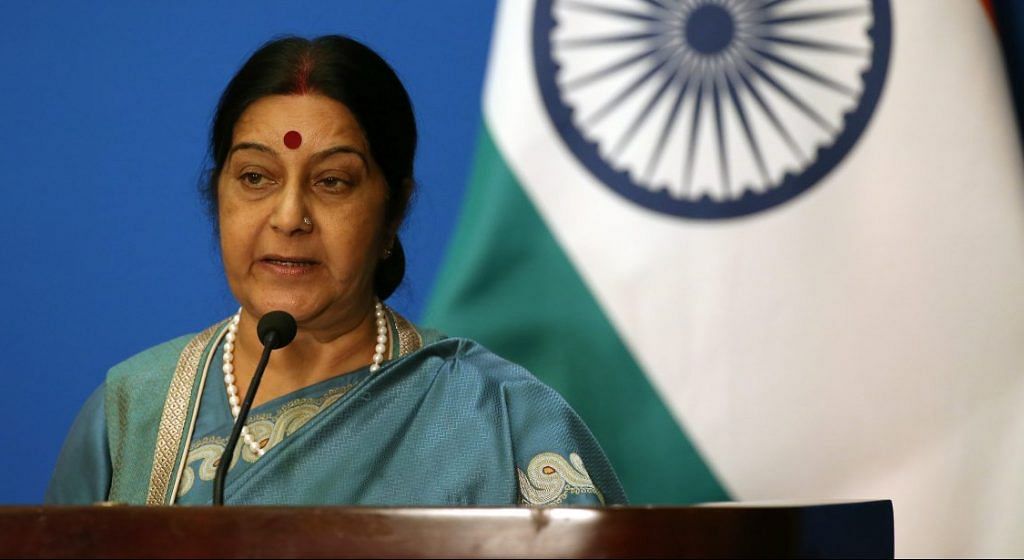Meeting between India & Pakistan comes as a realignment of political forces is underway on the global stage. It is also a crucial milestone for Modi in poll year.
New Delhi: The Narendra Modi government is making another gamble to restore normalcy in ties with Pakistan, with external affairs minister Sushma Swaraj set to meet her Pakistan counterpart Shah Mehmood Qureshi in New York on 26 September, on the sidelines of the UN General Assembly.
As ThePrint reported on 21 August, the real reason Prime Minister Modi wrote a letter to Pakistan Prime Minister Imran Khan immediately after the latter’s election was to reopen the channels of communication between India and Pakistan.
Who better to talk than the two foreign ministers?
Also read: Real reason behind Modi’s letter to Imran is to set up a foreign ministers’ meeting in NY
The Pakistani press is already talking about the meeting:
BREAKING BREAKING: Pak-India very close to fix Foreign Ministers meeting in New York @SMQureshiPTI and @SushmaSwaraj may hold bilateral meeting a day before SAARC FMs meeting(Sept 27). @najamsethi @zuberishahab @HamidMirPAK @MoeedNj
— Shaukat Piracha شوکت پراچہ (@ShaukatPiracha1) September 18, 2018
The significance of the meeting stands amplified given the far greater realignment of political forces taking place internationally.
As China rises to take its new place in the world, the US wants to get out of its debilitating war in Afghanistan. Certainly, Pakistan holds the key to ending that civil war — it began in 1996, with the fall of Kabul at the hands of the ISI-backed ‘mujahideen’.
Big move towards peace
The Swaraj-Qureshi meeting in New York follows reports that Pakistan is willing to allow Indian trucks to carry goods for Afghanistan through its territory.
This is a big move towards regional peace. Certainly, Pakistan will expect something in return.
Afghanistan President Ashraf Ghani is in Delhi today, Wednesday, to discuss the regional situation.
Meanwhile, the US has named a new special envoy to Afghanistan, its old ambassador to Kabul, Zalmay Khalilzad, a US citizen of Afghan origin. He is mandated to end the war in a way that all sides, including the Taliban, can save face.
Prime Minister Modi, who has just signed a path-breaking defence agreement with the US called COMCASA — which gives India the status of being its only non-NATO ally — cannot be immune.
Also read: India must not hurry Narendra Modi into a summit with Imran Khan
Khalilzad did not come to Delhi along with Jim Mattis and Mike Pompeo for the 2+2 dialogue on 6 September, but the dice had already begun to roll.
Modi, in his 19 August letter to Imran Khan, offered “constructive and meaningful engagement”.
The Indian government kept the letter quiet, but it was leaked by the Pakistani side — Delhi wanted a back-channel conversation, but Islamabad wanted to tell the world that India wanted to engage.
What’s on the table
Over the last month, highly placed sources in the Indian establishment told ThePrint, both sides have talked about a possible agenda for the Swaraj and Qureshi meeting in New York.
From a highly ambitious agenda — Pakistan wants India not to boycott the SAARC summit for the second time this year — to plucking low-hanging fruit that promote confidence-building measures, the pendulum of the Swaraj-Qureshi meeting could swing and stop anywhere between the two extremes.
Modi has already decided to mark the second anniversary of the “surgical strikes” in a big way on 29 September — three days after the Qureshi-Swaraj meeting.
Second, the tenth anniversary of the Mumbai attacks is coming up in November.
For the PM, the primary motivation for reopening the channel with Pakistan is to keep India’s borders safe in an election year. He wants no surprises, like the attack in Pathankot, which took place a week after his meeting with Nawaz Sharif in Lahore, or Uri.
Still, the PM may not be averse to a diplomatic gamble. If the signs from the Swaraj-Qureshi meeting are good, Modi is likely to be encouraged to take the relationship further.
